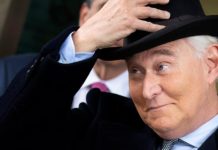Facebook’s new takedown sheds light on the evolving and expanding operation of Prigozhin’s disinformation specialists, who appear to be recruiting actors on the ground and establishing satellite offices in Africa, rather than running the entire operation from a nondescript business center in the Russian city of St. Petersburg, as they did during the 2016 election.
It’s part of a wider pivot to Africa by the Kremlin. Facebook’s takedown came just days after President Vladimir Putin’s lavish reception at a summit for 54 African countries in the Russian resort town of Sochi.
According to Facebook, the operation targeted Madagascar, the Central African Republic, Mozambique, the Democratic Republic of the Congo, Ivory Coast, Cameroon, Sudan and Libya, and was partially run from Africa using authentic local accounts.
At least one of the online pages that was disabled — called AFRIC — has a very much real-life presence on the ground both in Russia and Africa.
AFRIC, which describes itself as “a community of independent researchers, experts and activists,” was prominently featured at the Sochi forum and even announced its partnership with a foundation run by Malkevich, who was sanctioned by the US in connection with Prigozhin’s election interference efforts.
“Our foundation will provide our experts, scientists and economists, and AFRIC will provide its network across the whole continent, as it works virtually in all African countries,” Malkevich said at a meeting with Jose Matemulane, head of AFRIC.
Malkevich left the US late last year, around the same time the US Treasury sanctioned him for operating an English-language website called USA Really, saying the site was “posting “content focused on divisive political issues but is generally ridden with inaccuracies” and financed by the Prigozhin-funded Project Lakhta. Malkevich denies ever meeting Prigozhin. He told CNN he sees being on the sanctions list as a badge of honor.
Malkevich now runs an obscure think tank, the Foundation for the Protection of Traditional Values, which promotes the idea that Africa would benefit much more from cooperation with Russia, which is not trying to install “foreign norms” on its partners, unlike Western countries with their respective colonial pasts.
The foundation is already operational in Africa. It deployed political strategists to at least three African countries, two of which are listed in the Facebook takedown announcement.
In May, two researchers were arrested in Libya and accused of election interference. Malkevich told CNN they were simply conducting polls and sociological research — and found out that renegade Libyan general Khalifa Haftar is more popular than UN-backed Prime Minister Fayez al-Sarraj.
Those are the same two individuals described in the inauthentic network of Russian-linked accounts focusing on Libya. A page titled “Voice of Libya” echoed what Malkevich told CNN by posting this message: “The Government of National Accord [GNA] practices hypocrisy … the detention of two Russian citizens under the pretense that they are manipulating elections in Libya. But in reality, no elections are taking place in Libya now. So the pretense under which the Russians were arrested is fictitious and contrived.”
The Russian government openly backs Haftar; last year, Russia’s top brass hosted the general in Moscow. Yevgeny Prigozhin was spotted at that meeting as well, as were his private jets in Libya.
The US Treasury has recently ramped up sanctions against Prigozhin by blacklisting his yacht and private jets, seen all across Africa.
Prigozhin has been expanding his activities in Africa through his other venture in recent years. CNN investigations uncovered that the Prigozhin-linked companies sent mercenaries to Syria, the CAR, Sudan among other countries, and scored lucrative mineral and oil contracts. Prigozhin has previously denied being connected to mercenary companies.
Another ad taken down by Facebook pushed for a real-life Russian policy that could help advance Prigozhin’s goals in the CAR. The publication featured a photo of Putin and CAR president Faustin-Archange Touadéra at the Africa summit with a caption urging the UN to lift the arms embargo imposed on the country to allow for Russia’s supplies of heavy weapons.
While in Russia, Touadéra asked Putin for increased military assistance and even floated the idea of hosting a Russian military base.
Russian investigative outlet Proekt previously reported that Prigozhin became interested in soft-power projects in Africa in early 2018.
According to Proekt, his St Petersburg office had prepared for him an extensive research of 20 African countries and laid out possible pathways for creating a network of loyal political strategies on the continent.
However, Proekt described the efforts as of mixed success, with political strategists lacking necessary education and Prigohzin-backed candidates not securing the desired seats during local elections.
Malkevich’s efforts are yet to prove effective, but this is just one side of the Russian effort to project political influence onto the continent.
While Putin was courting dozens of African leaders and signing deals to supply more weapons to the continent (some even free of charge), members of his government were pitching another product: training courses with Russian propaganda experts.
Russian officials and state media bosses announced that African journalists are welcome to come to Moscow to training in things like social media engagement with Russian state-owned RT and Sputnik, both outlets mentioned in the Facebook takedown.
“Both Sputnik and RT are ready to go further than just hosting African journalists here for masterclasses, we understand it costs a lot to get to Moscow and can be too expensive for newsrooms in Africa,” said Alexey Volin, Russia’s deputy minister for communications. “We are ready to look into the possibilities of sending specialists from RT and Sputnik to various African countries and set up these masterclasses there on the spot, which will be more beneficial and convenient.”
Source : Nbcnewyork

















